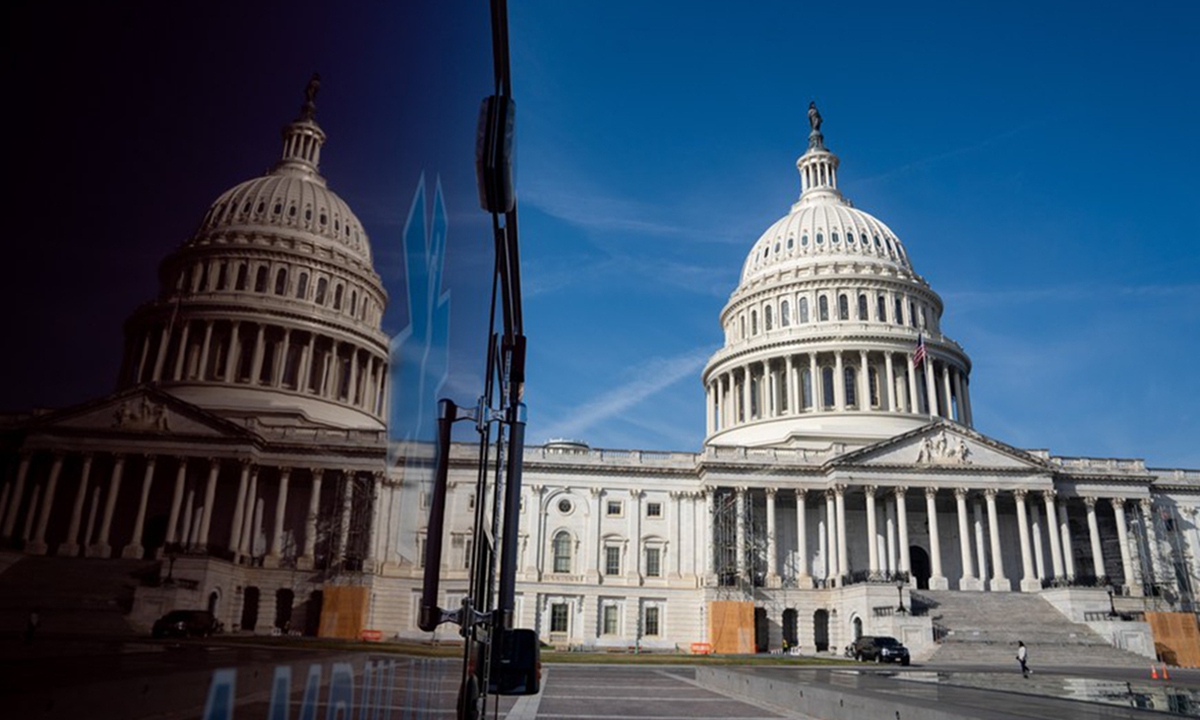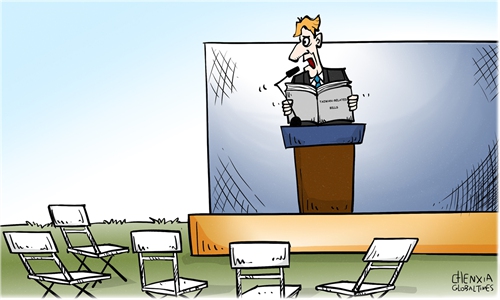
The US Capitol building is seen in Washington, DC., on November 4, 2022. Photo: Xinhua
The US House Select Committee on the Strategic Competition Between the United States and the Chinese Communist Party (Select Committee) recently adopted its first set of policy recommendations related to Taiwan. The report on Taiwan includes 10 findings and proposals on how to "preserve peace and stability across the Taiwan Straits," which grossly interfere in the Taiwan question and challenge China's bottom line.The 10 policy recommendations include: The US needs additional long-range missiles and unmanned vehicles in the Indo-Pacific region; the US and its allies need to strengthen and better coordinate collective planning for how they will deter or would respond diplomatically and economically to a crisis over Taiwan; improving combined training between the US and Taiwan island's militaries will bolster deterrence…
Since taking office, US Congress has significantly increased its efforts to hype and intervene in the Taiwan question, accelerating the promotion of its own version of the Taiwan-related agenda, and attempting to use the Taiwan question to contain China in the strategic competition between China and the US.
The frequency of congressional activities related to Taiwan is unprecedented.
First, Taiwan-related proposals have increased substantially. In particular, the new Congress has made great efforts to hype up the Taiwan question. At the current pace, it is expected to surpass the total number of Taiwan-related bills in the last Congress by 2023, a record high.
Second, the legislative process has clearly accelerated. On February, the US House of Representatives Financial Services Committee put forward three Taiwan-related proposals, the Taiwan Non-Discrimination Act, the Taiwan Conflict Deterrence Act, and the PROTECT Taiwan Act.
Compared with the notorious inefficiency of Congress in legislation, this rapid act clearly reflects the high attention and sense of urgency that Congress has toward the Taiwan question. They are unwilling to wait for the executive branch to act and instead want to express their opinions and take action first.
Third, there is a clear trend of the Republican Party dominating the Taiwan-related agenda in Congress. Congress has always been the base camp of US pro-"Taiwan independence" forces. A few lawmakers, especially Republican lawmakers, have been very active on the Taiwan question recently. They have hyped up false claims and called for the US to increase support for Taiwan.
Fourth, the US is pursuing a wide range of Taiwan-related activities. Since the beginning of this year, members of both parties have intensified their involvement in cross-Straits affairs by making statements related to Taiwan, visiting the island, and holding hearings on the Taiwan question.
Since the new Congress took office, rhetoric and actions toward Taiwan have gradually shifted from provocative to subversive and adventurous, attempting to fundamentally change one-China principle, overthrow the Taiwan-related consensus based on the Three Joint Communiqués between China and the US, and push the US to intervene in the Taiwan question in a more confrontational manner. The dangerous trend is mainly reflected in two aspects:
First, it explores the issue of Taiwan's "sovereignty" in legal and political terms and tries to deny the "one-China" principle entirely. Second, it increases military and diplomatic efforts to deter the mainland from the possibility of achieving reunification by force.
On the whole, Congress' stance on Taiwan policy is moving from "strategic ambiguity" to "strategic clarity." It aims to dismantle the global consensus on the "one-China" principle in legal terms and promote a substantive breakthrough in the relationship between the US and the Taiwan island, making adequate military and diplomatic preparations for a possible "conflict in the Taiwan Straits."
Given the bipartisan consensus on containment and suppression of China, playing the "Taiwan card" has become a priority option for many anti-China lawmakers. The approach of the 2024 elections may drive both parties to manipulate the Taiwan question even more feverishly. It can be said that a "radical" Congress is becoming a major source of chaos for peace and stability in the Straits at present and in the period ahead.
The US has vowed not to support "Taiwan independence," "two Chinas," or "one China, one Taiwan." It has repeatedly stated to adhere to the "one-China" policy. However, under Congress's continuous erosion and destruction, these promises are becoming empty words, and are more like an attempt to delude the Chinese side.
The Biden administration should be clear that when the pro-Taiwan forces in Congress are trying to wreak havoc, it is impossible for the China-US relationship to return to a stable and healthy development track, and Washington cannot expect Beijing to satisfy its need for cooperation on other issues. If the US side repeatedly uses the "separation of powers" or "lack of authority to interfere with congressional actions" as pretexts, it will only cause the international community, including China, to have serious doubts about the White House's ability to govern and international credibility.
The US side should be clear that the Taiwan question is the core of China's core interests. There will be no vagueness at all in our response to anyone who attempts to distort the one-China principle, and we will never back down in face of any act that undermines China's sovereignty and security. Those who play with fire on Taiwan will eventually get themselves burned.
The author is deputy director of the Department for Asia-Pacific Studies at the China Institute of International Studies. opinion@globaltimes.com.cn

